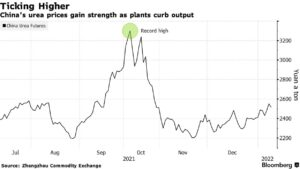Bloomberg's Leah Nylen reported Thursday that "a Colorado judge issued an order temporarily blocking the proposed $25 billion merger of Kroger Co. and Albertsons Cos., which has been challenged by…
Fertilizer Output in China Impacted by Air Pollution Curbs
Bloomberg News reported on Monday that, “China’s urea plants are getting caught up in Beijing’s drive to ensure blue skies for the Winter Olympics, which includes ordering factory shutdowns to curb air pollution.
Three plants in northern Shanxi province were asked to begin operating at 50% capacity due to pollution, driving up domestic prices for the nitrogen fertilizer, said Scotiabank analyst Ben Isaacson.
“Futures in Zhengzhou rose almost 5% on Friday to the highest since October, but have pared gains this week.”

The Bloomberg article pointed out that, “As Beijing ramps up pollution controls in the lead up to the winter games in February, more urea factories could be asked to suspend or cut output. China, a key supplier of urea, sulphate and phosphate to the global market, has curbed fertilizer exports since late last year to protect domestic supplies, a move that worsened a global price shock and risked stoking food inflation further.”
Also this week, Reuters writers Terje Solsvik and Victoria Klesty reported that, “Norwegian fertiliser maker Yara said on Monday it will wind down purchases of potash from Belarus by April 1 as international sanctions made it impossible to continue the trade.
“Yara estimates that it buys 10-15% of the annual output of state-owned Belaruskali, one of the world’s largest producers of potassium salt, or potash, the crop nutrient that is a major foreign currency earner for Belarus.”
The Reuters article added that, “Global potash prices are set to rally after the United States imposed sanctions on BPC [Belarus Potash Company], piling more pressure on farmers and consumers already facing rocketing costs and a global economy navigating rising food inflation, analysts and industry sources told Reuters in December.”





